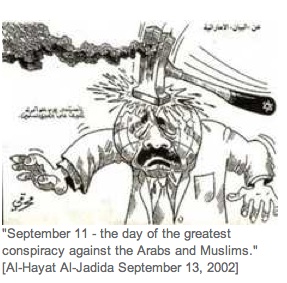UPDATES
Ten years on, 9/11 Conspiracies still Rampant in the Middle East
September 5, 2011 | Tzvi Fleischer

Following the 2001 9/11 attacks, it was widely reported that, in the Middle East, conspiracy theories were rampant that the attacks were actually plots by the American government, the Israelis, or both. Ten years down the track, there is less reporting of such beliefs, but have they faded away through the passage of time and the give and take of debate?
Sadly, as recent polls make clear, the reality is very much the opposite. These conspiratorial beliefs appear to have instead become settled wisdom in many Middle Eastern societies. As Eric Trager reports in the New Republic:
In a report on Muslim-Western relations released on July 21 of this year, the Pew Research Center asked Muslim respondents in eight countries-including Lebanon, Jordan, Egypt, Turkey, and Pakistan-whether they thought groups of Arabs carried out the 9/11 attacks on the United States. In every country, less than 30 percent of respondents professed their belief for the idea, and in Jordan, Egypt, and Turkey the level of acceptance is lower today than it was in 2006. Indeed, the same revolutionary Arab Street that toppled Mubarak in Egypt also registered the highest level of denial among all the countries surveyed, with a full 75 percent of respondents recording their disbelief.
Trager goes on to note that these findings are fully consistent with his own interviews with Egyptians over recent months he has done for his doctoral research. He reports that it is not only Islamists like the Muslim Brotherhood who regard it as obvious that the well-documented account of 9/11 as an attack by al-Qaeda is a cover up of what really happened. He quotes liberal members of the anti-regime protest movements expressing similar view. Frighteningly, even two Egyptian Government ministers he quotes, Egyptian Minister of Social Solidarity Gouda Abdel-Khalek and Vice-Prime Minister Ali El-Salmy treat it as doubtful, at best unproven, that al-Qaeda was responsible.
As Trager also notes, these widespread beliefs have serious foreign policy implications:
…the unpopularity of the United States in the Arab world continues to be fueled by the belief that Islamist terrorists had nothing to do with 9/11, with many claiming the attacks were an American, Israeli, or joint American-Israeli conspiracy. In this sense, overcoming 9/11 revisionism is, perhaps, the greatest challenge facing American public diplomacy in the coming decade: So long as such conspiracy theories persist, Arabs will continue to view American policies aimed at preventing “another 9/11” as thoroughly illegitimate since, as they see it, 9/11 is just a big American lie…
Washington, which must view the pervasiveness of Arab 9/11 conspiracy theories as a fundamental challenge to the legitimacy of our ongoing fight against terrorism. The more deeply that 9/11 revisionism becomes ingrained in Arabs’ views of history, the harder it will be to advance policies for preventing another attack…
He’s right, but I would even go a step further. There are few things contributing to the danger of a “clash of civilisations” more than these conspiracy theories in the Middle East. Many Western statesmen, pundits and intellectuals are, rightly, very concerned that the battle against Islamist terror not be turned into a West versus the Islamic World conflict, as predicted by American political scientists Samuel Huntington in his well-known book from 1996.
To this end, in the fight against Islamist terror sparked by 9/11 it has been, correctly, stressed over and over that Islam is not the enemy, but a religious tradition that deserves respect; that at all costs any backlash against Muslims living peacefully in the West must be prevented, that the terrorists threaten mainstream Muslims and Arab governments as much as Westerners. Less laudably, sometimes this necessary effort has extended to over-the-tops efforts to avoid or suppress even careful, considered discussion of the Islamist ideological movement which motivates al-Qaeda and related terrorist groups, or to forms of linguistic political correctness with respect to terrorism.
The point is that all these efforts are largely wasted if 9/11 conspiracy theories continue to predominate in Middle Eastern public opinion. Think about it. Say you genuinely believe, as most Middle Easterners apparently do, that the Americans, or possibly their Zionist allies, deliberately launched planes at buildings to kill 3000 Americans just to they could then launch wars in the Middle East. They supposedly did this, not to counter a violent threat, but either out of a desire to steal resources, or for conquest or perhaps out of sheer lust for the blood of Arabs and Muslims. What other belief about subsequent events can you then have other than that the Americans and their allies are your eternal enemies, who hate you so much they’re willing to kill their own just to have an excuse to attack you?
9/11 conspiracy theories have become settled wisdom in the Middle East because there has been there very little “give and take of debate” there – which would expose the absurdity of the conspiratorial claims and the overwhelming evidence for al-Qaeda’s responsibility. Today, with the Arab Spring opening up settled wisdom in the region, and hopefully the beginnings of a less restricted media, few foreign policy goals should be more important for the West than countering the predominance of these conspiratorial beliefs, which make everything else we hope to achieve there – democratisation, stability, reducing weapons proliferation, Israeli-Palestinian peace, as well as counter-radicalisation and counter-terrorism – so much more difficult.
Tzvi Fleischer
Tags: Antisemitism





